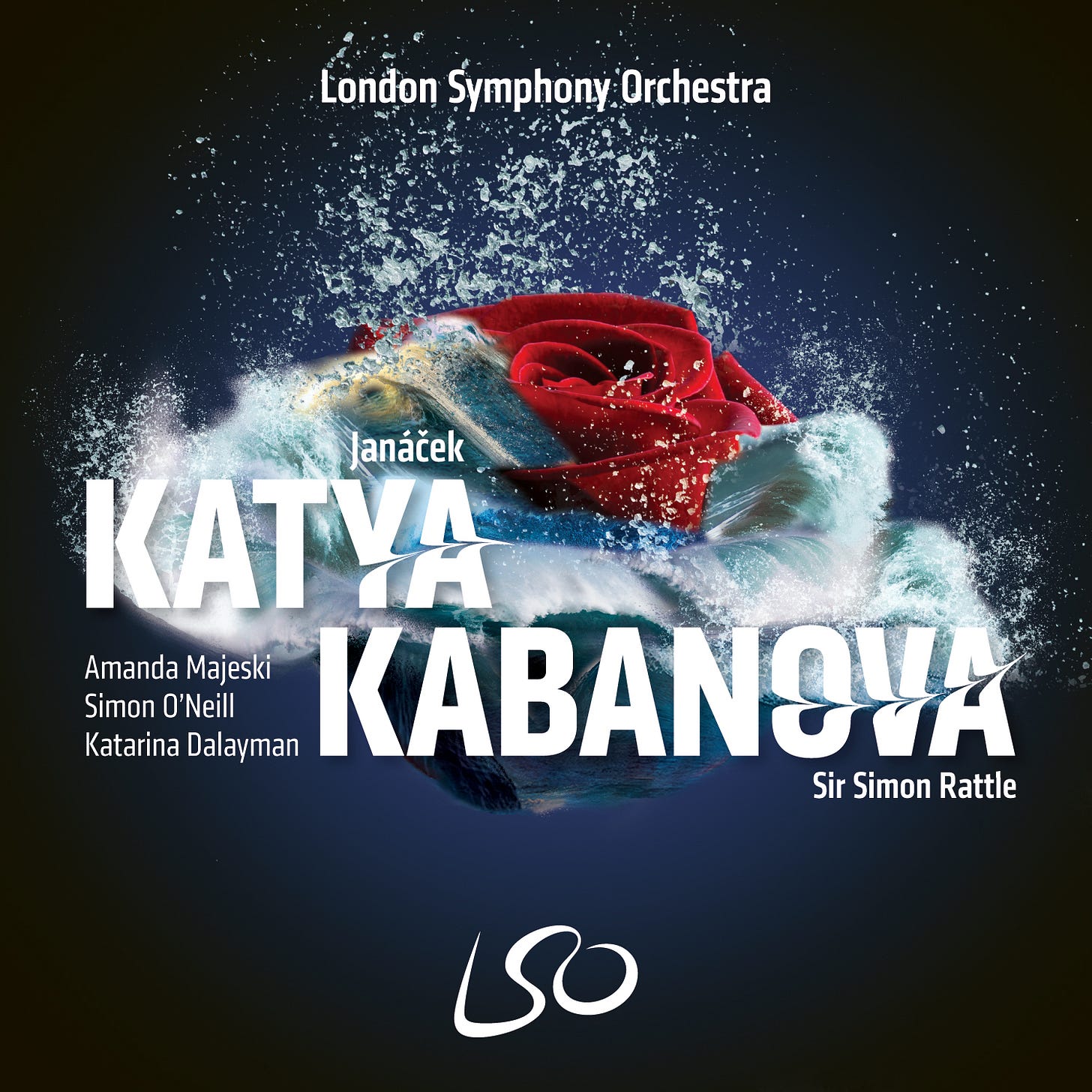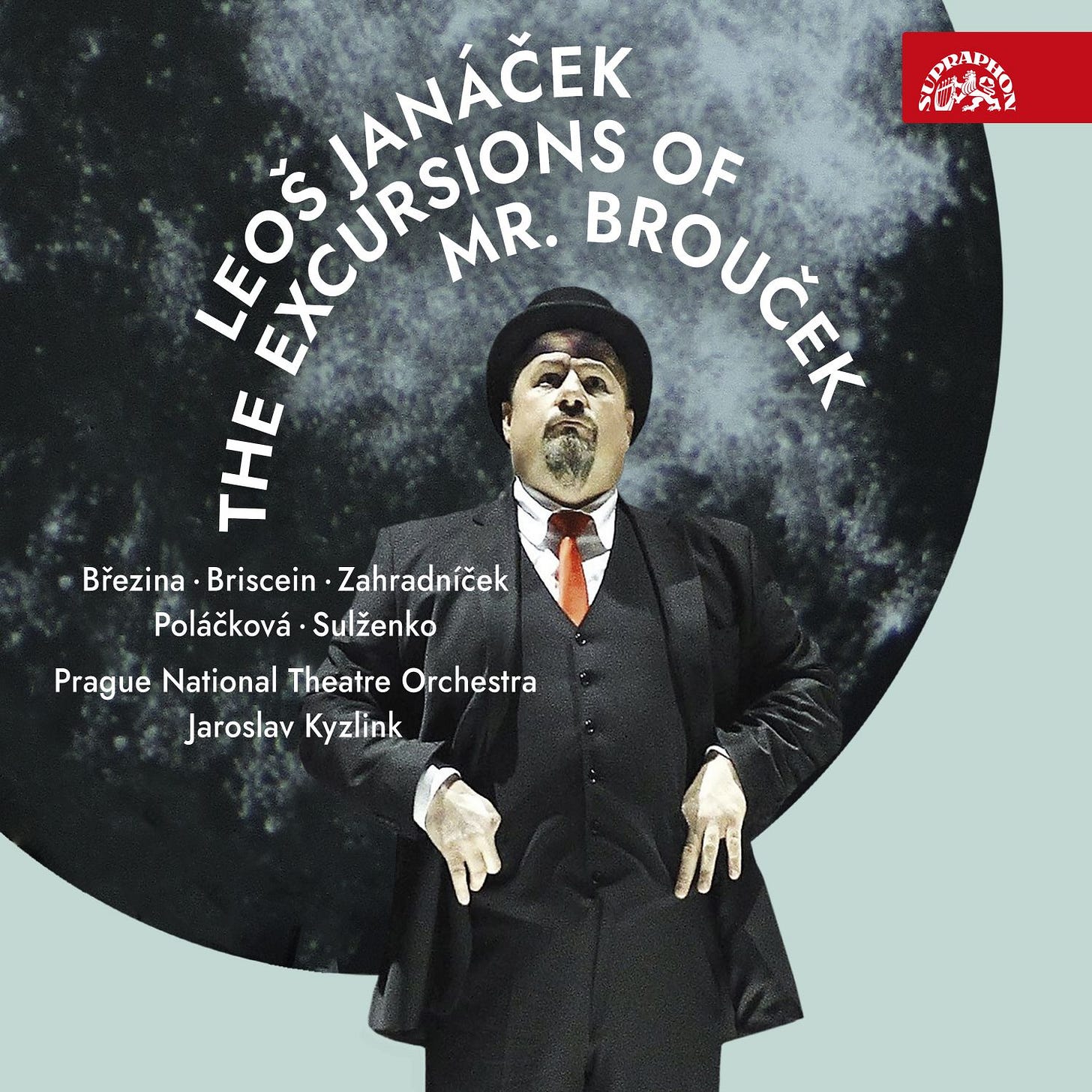Janáček Revisited
Opera recordings from London and Prague
Katya Kabanova Amanda Majeski Boris Grigorjevič Simon O’Neill Marfa Kabanová (Kabanicha) Katerina Dalayman Tichon Kabanov Andrew Staples Dikoj Pavlo Hunka Váńa Kudrjaš Ladislav Elgr Varvara Magdalena Kožena Kuligin Lukáš Zeman Glaša/Fekluša/Servants Claire Barnett-Jones
Conductor Simon Rattle
London Symphony Orchestra and Chorus Director William Spaulding
LSO Live LSO0889 (two CDs)
Jenůfa Agneta Eichenholz Kostelnička Buryovka Katerina Karnéus Laca Klemeň Aleš Briscein Števa Buryja Nicky Spence Old Buryjovka Carole Wilson Foreman of the Mill/Mayor Jan Martiník Mayoress Hanna Hipp Karolka Evelin Novák Jano Erika Baikoff Barena/Herdswoman Claire Barnett-Jones
Conductor Simon Rattle
London Symphony Orchestra and Chorus Director, Simon Halsey
LSO Live LSO0897 (2 CDs)
Mr Brouček Jaroslav Březina Mazal/Blankytný/Petrik Aleš Briscein Málinka/Eterea/Kunka Alžběta Poláčková Sakristán/Lunobor/Domsik František Zahradniček Svatopluk Čech Jiří Brückler Wűrfl/Čaroskvouci/Councillor Jiří Sulženko Číšniček/Child Prodigy/Student Doubravka Součkova Kedruta Stanislava Jírkú Poet/Oblačný/A Voice Roman Janál Painter/Dohuslav/Vojta Josef Moravec Composer/Harper/Miroslav Martin Šrejma
Conductor Jaroslav Kyzlink
Prague National Orchestra and Chorus Directors Martin Buchta, Pavel Vanék
Supraphon SU 4339-2 (2 CDs)
Before Charles Mackerras made his acclaimed Decca recordings with the Vienna Philharmonic in the late 1970s and 80s, Janáček operas on disc were almost the exclusive preserve of Supraphon, the state-owned label of Czechoslovakia’s communist regime. The strength of the Supraphon series lay in the contribution of native Czech artists, mostly from the National Theatre ensemble in Prague. My first Jenůfa, for example, was a Supraphon recording licensed to EMI in the west, starring Libuše Domaninská and Nadezhda Kniplová as the heroine and her step-mother, the Kostelnička.
Thanks to Mackerras’s decades-long links to Czech music-making during the communist era, his recordings were also able to draw on the services of Czechoslovak artists, notably Eva Randová, Lucia Popp and Peter Dvoršký, giving his Decca series its own authenticity - even when the leading roles in three of the operas were sung by the Swedish soprano Elisabeth Söderström. Thanks in no small part to these recordings, Janáček operas - especially Jenůfa, Katya Kabanova andThe Cunning Little Vixen - began to establish a place in the international repertoire.
But three other operas from the composer’s maturity - The Excursions of Mr Brouček, The Makropoulos Case and From the House of the Dead - remain a tough sell in the theatre. That is why the London Symphony Orchestra’s ongoing Janáček cycle with Simon Rattle, recorded live in concert at the Barbican, is such a potent statement.
These LSO Live spinoffs began with the release in 2020 of The Cunning Little Vixen starring Lucy Crowe as the Vixen and Gerald Finley as the Forester, semi-staged at the Barbican Hall in 2018. If all goes to plan, by 2028 there should be a complete set of the composer’s six mature masterpieces. Says Rattle: “When we first played (Vixen), I realised that the music suited the LSO so perfectly with their virtuosity, their passion, their…humour and refinement. We decided almost immediately that we should just simply do all of them.”
Rattle clearly has no doubts that these operas occupy a central position in the opera repertoire of the 20th century, and the three released so far herald a legacy, I would suggest, at least as significant as Charles Mackerras’s fabled Decca series.
Last year saw the release of Katya Kabanova (recorded live in January 2023), while Jenůfa (recorded in January 2024) has just appeared. The Katya cast includes two of the participants in the Royal Opera’s most recent production - American soprano Amanda Majewski in the title role and British tenor Andrew Staples as Tichon. For the role of Kabanicha, the (usually) terrifying mother-in-law-from-hell, Rattle cast the Swedish soprano-turned-mezzo Katerina Dalayman. None of these singers - nor New Zealand tenor, Simon O’Neill - is as memorable as the finest interpreters on disc (Gabriela Benačkova’s Katya and Eva Randová’s Kabanicha, for example, in Mackerras’s Supraphon recording from Prague, worth seeking out as a supplement to his Decca recording). The most distinctive performers for Rattle are Magdalena Kožena’s mature but still brightly sung Varvara, charming in her interplay with Ladislav Elgr’s Kudrjaš (their folk-based songs and duets are the opera’s most appealing music), and American baritone Pavlo Hunka’s stentorian, bullying Dikoj.
But it is the orchestral playing and Rattle’s impassioned conducting that make this LSO Live release an essential foil to Mackerras’s Vienna and Czech Philharmonic recordings. While Janáček’s music may not be in its blood, the LSO captures the spiky astringency of his instrumental palette, which Rattle tempers with an emotional glow that courses through Katya’s music, the aural depiction of the river Volga and a dazzling rhythmic élan that encourages the folk-inspired music to dance.
The same qualities shine through the just-released Jenůfa discs, featuring as strong a cast as any on disc. The Lithuanian star soprano Asmik Grigorian had been scheduled to sing Jenůfa but she cancelled. Her replacement, Swedish soprano Agneta Eichenholz, was something of an unknown quantity in London, despite having sung Berg’s Lulu at Covent Garden in 2009. Eichenholz’s voice might be a less penetrating instrument than Grigorian’s but in this performance she sings her with her entire body and soul, in one of the most heart-rending interpretations of the role I have heard anywhere. There is a fragile delicacy to her singing, reminiscent of her compatriot Södërström on the Mackerras set well complemented by Katerina Karnéus’s Kostelnička, who comes across more emphatically here on disc than it did last year in the concert hall. The Swedish mezzo has a softer grained timbre than is usual for this role (often sung by dramatic sopranos). At the Barbican, I thought the dramatic impact of her performance wanting in cutting edge - especially in the scene after she has drowned Jenůfa’s child and suffers a mental collapse as the wind blow open the shutters and she imagines the figure of Death peering through the windows. Here, close-miked, the effect is shattering, with the LSO piccolo piercing the storm music with menacing stridency.
Karnéus brings a warmth to her beautifully sung account of Kostelnička’s music quite unlike the rasping scolds of traditional (soprano) interpretations of the role. But she spits out her curse at Števa and projects the word ‘načuhovala’ (sneaking up on me) as if pierced by a poisoned dart. The men in Jenůfa’s life, feckless Števa (father of her child) and sincere Laca, are taken by two of the most experienced Janáček tenors of the day, the Scot Nicky Spence and Czech Aleš Briscein (they have sung both tenor roles in Jenůfa as well as the leads in most of the other Janáček operas). They could hardly be bettered here (if not by each other), though Briscein has the more fearless top notes. His final declaration of love to Jenufa is truly heartfelt, and Rattle’s LSO underlines the refulgence of Janáček’s climactic catharsis.
Among the supporting cast, Carole Wilson’s Grandmother, Jan Martinik’s Foreman of the Mill/Mayor and, especially, the young Croatian soprano, Evelin Novák (who already sings Jenůfa on stage) stand out in this memorable performance.
Briscein sang the youthful tenor leads in Rattle’s LSO performance of The Excursions of Mr Brouček earlier this month, and he stars in the same roles in Supraphon’s latest recording of this opera, based on a National Theatre Prague production in 2021. Briscein is a Brouček veteran of nearly 20 years standing, having sung three of the smaller parts in the late Jiři Bělohlávek’s 2007 Barbican Hall performance with the BBC Symphony Orchestra, subsequently released by Deutsche Grammophon. Jaroslav Březina - who also made cameo appearances in that Brouček - is outstandingly characterful as the disreputable titular anti-hero. Alžběta Poláčkova sings the three heroines (Malinka, Etherea and Kunka) with bright Slavic tone, and all the comprimario parts are entirely idiomatic, as is the playing and singing of the National Theatre Orchestra and Chorus. The overall sense of ensemble is palpable. This is a fine way to get acquainted with the opera, but unfortunately libretto and translation are not provided, in contrast to LSO Live’s admirably lavish booklets.
With Rattle’s Brouček recording now in the pipeline, this opera’s burgeoning discography must surely improve its fortunes in the theatre. I certainly hope so.





Dearest Hugh-
After reading your reviews of these recordings, I am moved to buy them and have the experience for a long time to come. thanks so much for this review. You know how dear JENUFA is to me...... And Amanda was a Curtis student that I watched grow into the lovely singer of today. Hope all is well with you.xoxox
Apart from Vixen, which I have known and loved for many years (the late, lamented Co-Opera Co staged a lovely production some years ago), I am still finding my way into the Janacek operatic repertoire. As ever, Hugh is an informative, insightful and knowledgeable guide.